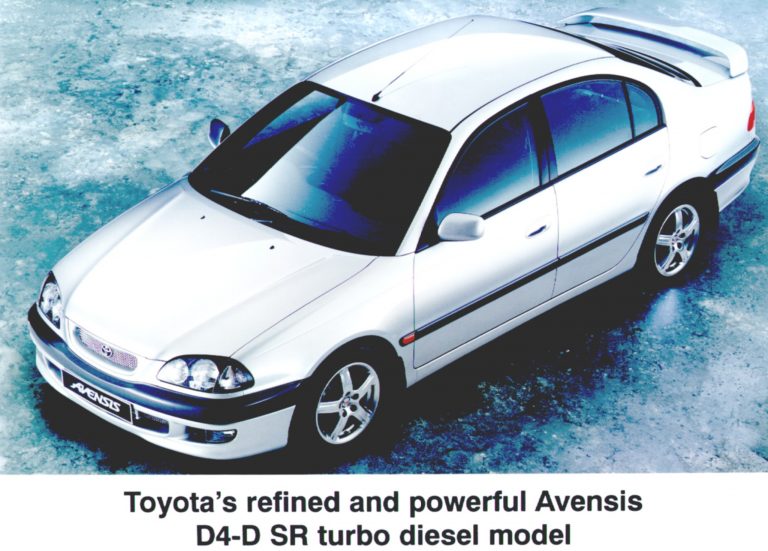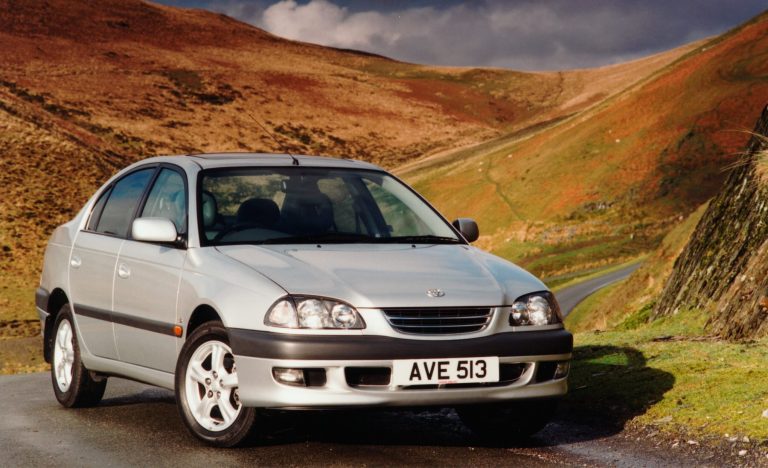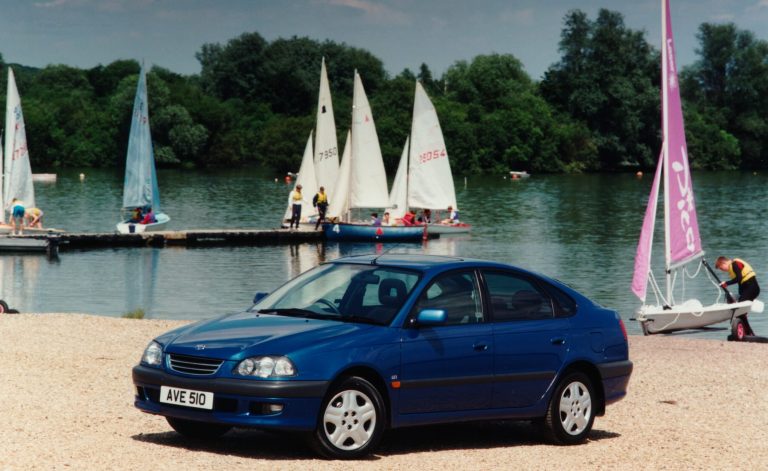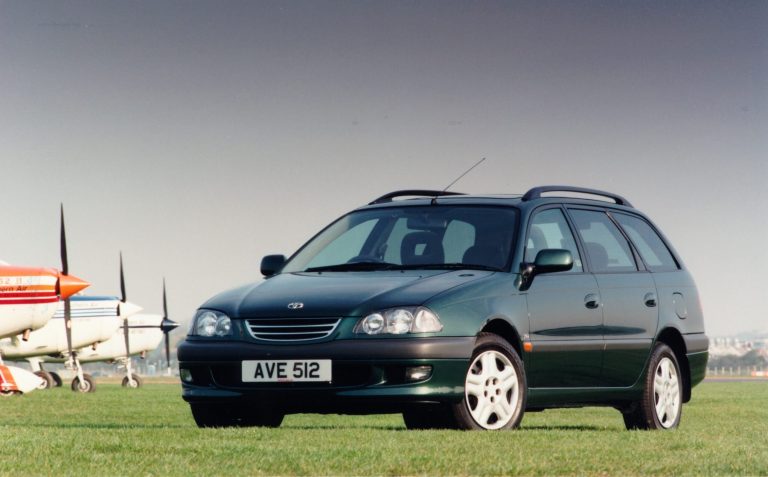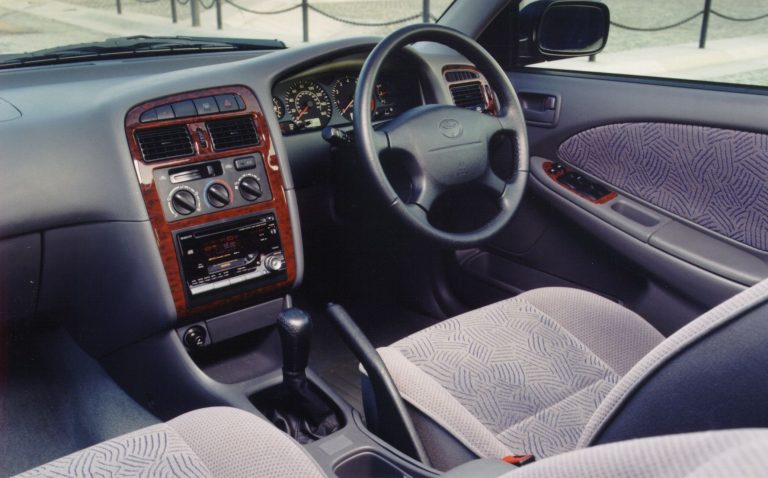Toyota Avensis SR D4-D
Advanced Diesel Technology for the New Millennium
Key points:
- All-new high efficiency ‘common rail’ direct injection turbo diesel engine for the Avensis: The D4-D
- D4-D: Direct injection, 4 stroke common rail Diesel engine
- Toyota’s first twin-cam four-valve-per-cylinder diesel engine
- Strong performance and economy – 0-62mph in 11.5secs, 47.9mpg
- Petrol-like engine refinement
- High torque engine output for easy driveability – 184 lb ft at 2000rpm
- New engine available with high specification SR trim grade
- £17,600 on the road
- Air conditioning, 15″ alloy wheels, CD player
- Twin front and side airbags, anti-lock brakes
- Rear spoiler, mesh front grille, front fog lights
- Low group 9E insurance
- Choice of five exterior metallic paint finishes at no extra cost
- Sporty ‘San Remo’ upholstery
- Black wood interior trim
Toyota is introducing a new state-of-the-art ‘common rail’ direct injection turbo diesel engine into its successful Avensis family car offering petrol-like refinement and performance with the potential for nearly 48mpg.
The new ‘D4-D’ engine (Toyota nomenclature for Direct injection 4 stroke Diesel) is available now in the high specification Avensis SR saloon model matched to a five speed manual gearbox.
The Avensis SR D-4D joins its petrol-powered SR equivalents in the Avensis range and offers a high level of standard specification including air-conditioning, 15 inch alloy wheels, CD player, anti-lock brakes and twin front and side airbags.
This new high performance turbo diesel model is complementary to the indirect injection turbo diesel Avensis models that have been a feature of the range since the Avensis was launched in January 1998. The Avensis SR D4-D is priced at £17,600 on the road and expected to be both a popular family and company car.
INTELLIGENT TECHNOLOGY FOR THE DIESEL DRIVER
The specification of the new D4-D engine reads more like that of an advanced petrol engine. Consequently, the D4-D is the most advanced diesel engine design to date from the world’s second largest manufacturer of diesel engines.
This 2.0-litre engine features twin overhead camshafts operating four valves per cylinder. A compact but large capacity turbocharger has reduced clearance of the compressor impeller and a mixed flow turbine to allow relatively high boost pressure with excellent throttle response. An intercooler is also used to increase efficiency.
Power and torque outputs are a healthy 110bhp (82 kW) at 4000rpm with a thumping 184 lb.ft (250 Nm) of torque developed at just 2000rpm. However, a flat torque curve means that over 147 lb.ft (200 Nm) of torque is available between 1700rpm and 3800rpm. These outputs are able to power the Avensis SR D4-D from 0-62mph in 11.5secs and on to a top speed of 121mph while still returning 47.9mpg on the combined fuel cycle.
WHAT IS ‘COMMON RAIL’ DIRECT INJECTION?
Until recently, diesel engines for passenger cars and most light commercial vehicles generally relied on a secondary chamber or ‘swirl chamber’ in which to combine the air/fuel mixture before injection into the cylinder. These are known as indirect injection diesels and are still commonly used.
With the increasing importance of CO2 reduction, however, engine designers have been developing direct injection systems which offer superior combustion efficiency and improved performance.
Such direct injection diesel engines, although more efficient than their indirect injection forebears, are prone to emitting black smoke at low speeds and are also significantly less refined due to diesel ‘knock’.
In conjunction with commercial partner Denso, Toyota has produced a state-of-the art ‘common rail’, direct injection turbo diesel engine – The D4-D. In fact Toyota had already developed heavy duty common rail diesel engines for trucks produced by Hino Motors from 1995.
The D4-D’s common rail injection system allows independent control of very high injection pressures, timing and volume in response to engine operating conditions in the same way electronic fuel injection functions on petrol engines. Common rail injection also allows pilot injection, which greatly reduces combustion noise and solves other problems plaguing conventional injection systems. The common rail system offers:
Pilot injection which reduces combustion noise and promotes refinement
High-pressure injection at low rpm ranges for good low-end torque and reduced black smoke emissions
Improved driveability through reduced injection cycle fluctuations and cleaner exhaust emissions
After-injection improves performance of NOx reduction catalytic converter.
SR SPECIFICATION ENSURES LOTS OF EQUIPMENT
The D4-D engine is fitted to just one model in the Toyota Avensis range – the SR saloon. SR specification ensures a high tally of equipment including 15 inch alloy wheels with locking nuts, anti-lock brakes, twin front airbags and side airbags, electric windows and door mirrors, RDS radio cassette/CD player, alarm and immobiliser, rear spoiler and San Remo suede-effect upholstery with black wood trim. A competitive group 9E insurance rating has been awarded by the Association of British Insurers.
As well as unique SR badging, the car also wears D4-D badging on its front wings to denote its special engine. The SR D4-D is available in five exterior metallic paint finishes: Lucerne Silver, Satin Black, Chianti, Caribbean Blue and Tuscan Plum.
A TASTE OF WHAT’S TO COME
The 2.0-litre Avensis D4-D engine is the first Toyota common rail direct injection diesel engine to be fitted in one of its passenger cars. At the 1997 Frankfurt Motor Show Toyota unveiled a family of three common rail direct injection turbo diesel engines – a 1.4-litre, two valve per cylinder SOHC engine, a 2.0-litre four valve per cylinder DOHC engine (now revealed as the Avensis D4-D engine), and a 2.4-litre four valve per cylinder DOHC engine.
The 1.4-litre engine is intended for use in a small passenger car and the 2.4-litre unit in future light commercial vehicles. At the Tokyo Motor Show this year, Toyota revealed a new 3.0-litre four valve per cylinder DOHC common rail turbo diesel engine intended for a future sport utility vehicle application. Clearly, the new D4-D engine in the Avensis is a taste of Toyota’s common rail diesel future.
TOYOTA’S LONG DIESEL HISTORY
Toyota, which began mass-producing its first light-duty diesel engine in 1957, has since then been at the forefront of diesel development. Among other technical advances, Toyota’s pioneering diesel technologies have included the first production use of fully electronic fuel pump control (1982), ceramic fibre reinforced pistons (1982), torsional-damper flywheels (1984), two-stage pilot injection (1988), and direct-injection in a four valve per cylinder engine of less than 110mm bore (engines of 94mm and 108mm bore appeared in 1995). Toyota makes more types of diesel engine than any other car manufacturer, and ranks second in the world in annual diesel engine production.
AVENSIS D4-D VS THE COMPETITION
|
AVENSIS SR 2.0 D4-D 4 door Manual |
PASSAT S (A/C) 1.9 TDi 4 door Manual |
PEUGEOT GLX 2.0 HDi 4 door Manual |
VECTRA GLS 2.0 DTi 4 door Manual |
|
| On the road price |
£17,600 |
£17,880 |
£18,400 |
£18,350 |
| Driver and front passenger airbag |
√ |
√ |
√ |
√ |
| Front seat side airbags |
√ |
√ |
– |
– |
| ABS |
√ |
√ |
√ |
√ |
| Alarm with interior protection |
√ |
– |
– |
– |
| Air conditioning |
√ |
climate control |
climate control |
√ |
| Sunroof |
– |
– |
– |
– |
| Electric windows |
√ |
Front |
√ |
Front |
| Electric heated exterior mirrors |
√ |
√ |
√ |
√ |
| RDS Radio/CD Player |
√ |
Cassette |
√ |
√ |
| Leather steering wheel |
√ |
– |
– |
– |
| Alloy wheels |
√ |
– |
√ |
√ |
| Rear Spoiler |
√ |
– |
– |
– |
| Standard metallic paint |
√ |
– |
– |
– |
| Three year warranty |
√ |
√ |
– |
– |
| Spec adjusted price |
£17,600 |
£18,855 |
£19,275 |
£19,125 |
| Avensis advantage |
7.1% |
9.5% |
8.7% |
AVENSIS D4-D TECHNICAL SPECIFICATION
|
ENGINE |
|
| Type | In line transverse 4 cylinders, front wheel drive |
| Valve mechanism | DOHC 16 valve |
| Injection system | Common rail direct injection |
| Bore x Stroke (mm) | 82.2 x 94.0 |
| Compression ratio | 18.6:1 |
| Displacement (cc) | 1998 |
| Max. Power bhp (kW) | 110 (82) @ 4000rpm |
| Max. Torque lb.ft (Nm) | 184 (250) @ 2000rpm |
|
ACCELERATION |
|
| 0-62mph (0-100km/h) | 11.5sec |
| Maximum speed | 121mph (195km/h) |
| Gear Ratios | |
| 1st | 3.538:1 |
| 2nd | 2.045:1 |
| 3rd | 1.333:1 |
| 4th | 0.972:1 |
| 5th | 0.731:1 |
| Final drive | 3.684:1 |
| Reverse | 3.583:1 |
| FUELCONSUMPTION mpg (L/100km) | |
| Combined | 47.9 (5.9) |
| Urban | 35.3 (8.0) |
| Extra-urban | 58.9 (4.8) |
| CO2 emissions (g/km) | 158 |
|
DIMENSIONS |
|
| Overall length (mm) | 4490 |
| Overall width (mm) | 1710 |
| Overall height (mm) | 1425 |
| Wheelbase (mm) | 2630 |
| Track width (mm) front | 1480 |
| Track width (mm) rear | 1450 |
| Boot capacity cu ft (Litres) | 17.5 (500) |
| Fuel tank capacity gallons (Litres) | 13.2 (60) |
| Minimum turning radius (m) wheel/body | 5.4/5.8 |
| Kerbweight (kg) | 1395 |
| Gross vehicle weight (kg) | 1830 |
| Towing capacity (kg) braked trailer | 1300 |
|
SUSPENSION |
|
| Front | MacPherson strut with L-shaped lower arm |
| Rear | MacPherson strut with dual link |
|
BRAKES |
|
| Front | Ventilated discs |
| Rear | Drums |
|
STEERING |
|
| Type | Power rack and pinion |
| Ratio | 44.1:1 |
| Turns lock to lock | 3.0 |
|
TYRES AND WHEELS |
|
| Wheel size | 15″ alloy |
| Tyre size | 195/60 HR15 |
| Spare wheel | Standard full size |

